
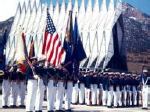




READY OR NOT? FIVE MT. LEBANON GRADS REFLECT
ON THE YEAR THEY'LL NEVER FORGET
BY ALISON NIPAR
PHOTOS BY DAVE GRIB
Reprinted from the MT. LEBANON October 1999
If campus handbooks sold life curriculum guides for freshmen, it might be one of the only books students wouldn't dread buying. Chapters on how to manage roommates, dating, studying and budgets would be spelled out.
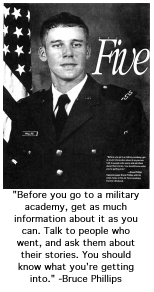 But
the only life survival guide freshman students get is the one they
create themselves gradually, as they negotiate their first year.
But
the only life survival guide freshman students get is the one they
create themselves gradually, as they negotiate their first year.
Mt. Lebanon parents and students are used to hearing that our school district is one of the top in the country. We expect our students to be well prepared for the challenges of higher education. But are they? Only the end of the year will tell.
In June 1998, we decided to follow five new Mt. Lebanon grads through their first year. We picked representatives of five different kinds of colleges and universities Mt. Lebanon students typically pursue - a small, private liberal arts college, an Ivy League university, a military academy, a large state university and a four-year art school. We interviewed each student several times.
We had no idea how things would turn out. Happily, all five had a good year. That may not be the case for every Mt. Lebanon student-and it's not the case for students nationally. Still, it's heartening to hear success stories in a community where the cost of educating each student was $8,401 in 1998-99. Of Mt. Lebanon's class of 1998, 92 percent went on to four-year colleges.
Of the five students we tracked, one found that college reinforced what she had always wanted to do, and another learned to appreciate her parents more. Two found their peers weren't as intimidating as they had expected, and one was surprised at the amount of responsibility he could handle. All say they learned to handle new challenges, troubleshoot problems and prioritize their time. In the process, each learned a little more about themselves.
A school year is about to begin, and Bruce Phillips considers
himself at least half-prepared for the Air Force Academy 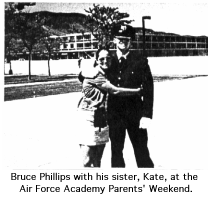 in
Colorado Springs. "I'm really out of shape, but I'm mentally ready
for it," says Phillips, even though he played lacrosse in high
school. "I have to go into it with the attitude they'll break you
down before they'll build you back up."
in
Colorado Springs. "I'm really out of shape, but I'm mentally ready
for it," says Phillips, even though he played lacrosse in high
school. "I have to go into it with the attitude they'll break you
down before they'll build you back up."
Phillips, son of Bruce and Marion Phillips, Vernon Drive, has had his heart set on being a pilot throughout most of high school. Attending the Air Force Academy seemed like a natural choice. Although he had to undergo a rigorous, yearlong application process of academic, physical and character assessments, he knew that, if appointed, he'd get a free, top-notch education worth nearly a quarter million dollars. He'd also have a job with the Air Force after graduation and would learn the skills necessary to one day become a commercial pilot.
Some of his friends were a little skeptical about his choosing a military academy. "They laughed," Phillips says, explaining that, "I'm usually the type to talk back, and I don't take well to authority.
"I suppose that will change in a few days," he concedes.
He's willing to change; still, he's determined not to let the intense, highly structured lifestyle at the academy overshadow what he values about himself "I'm easy-going, and I like to have a good time," he says. "I just hope it gives me a little more insight into what I can be."
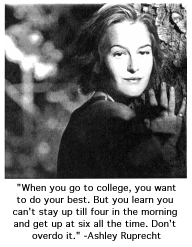 Over
on Parkview Drive, Ashley Ruprecht can't wait to start school at The
Cooper Union for the Advancement of Art and Science, in the heart of
New York City's Greenwich Village. She'll study painting and
sculpting and will be among the school's 60 freshmen, all of whom
receive a four-year tuition scholarship worth $100,000.
Over
on Parkview Drive, Ashley Ruprecht can't wait to start school at The
Cooper Union for the Advancement of Art and Science, in the heart of
New York City's Greenwich Village. She'll study painting and
sculpting and will be among the school's 60 freshmen, all of whom
receive a four-year tuition scholarship worth $100,000.
"It's been a lifelong dream to go to New York and study art," says Ruprecht, daughter of Art and Janet Ruprecht. "New York is art. It's inspiring; I like the fast pace."
Underneath the excitement, she's concerned about learning to get around the city on the subway and keeping up with the course work, saying a friend at the school warned the freshman year is the hardest.
And Ruprecht worries how her talent will fare against the other artists, many of whom have studied privately or attended magnet-type schools that allowed them to specialize in art. Even though she received a number of artistic honors, including the Leon Arkus Jump-Start Award, given to promising high school visual artists, Ruprecht wonders if their talent will intimidate her.
Amy Cimini shares Ruprecht's concern about attending schools with other top talents.
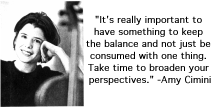 Daughter
of Rosbury Place residents Audrey and David Cimini, Amy is headed for
Oberlin College and Conservatory in Ohio, where she'll attempt a dual
degree in viola performance and English. Oberlin seemed to provide
the best mix of music education and academics.
Daughter
of Rosbury Place residents Audrey and David Cimini, Amy is headed for
Oberlin College and Conservatory in Ohio, where she'll attempt a dual
degree in viola performance and English. Oberlin seemed to provide
the best mix of music education and academics.
Although Cimini has been playing the viola for 10 years, was a member of the Pittsburgh Youth Symphony Orchestra and the Mt. Lebanon High School Orchestra, she assumes some of her peers will be more talented. "I worry about keeping up and getting burned out," says Cimini, a member of the National Honor Society in high school.
She's curious about how she'll fall into the hierarchy of the school's 500 talented freshmen.
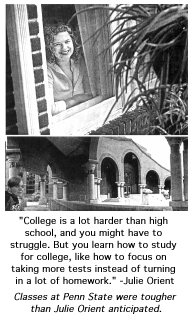 For
Julie Orient, Atlanta Drive, it's not so much how she'll stack up to
the other freshmen but whether she'll be noticed at all among Penn
State's mass of 4O,OOO. At the main campus in State College, she
expects a noticeable change in the 22:1 student-teacher ratio she'd
been accustomed to at Mt. Lebanon High School. "There are so many
kids. If I need help, I hope I'd know where to get it," she says.
Orient graduated high school cum laude and was a member of the
National Honor Society.
For
Julie Orient, Atlanta Drive, it's not so much how she'll stack up to
the other freshmen but whether she'll be noticed at all among Penn
State's mass of 4O,OOO. At the main campus in State College, she
expects a noticeable change in the 22:1 student-teacher ratio she'd
been accustomed to at Mt. Lebanon High School. "There are so many
kids. If I need help, I hope I'd know where to get it," she says.
Orient graduated high school cum laude and was a member of the
National Honor Society.
But these concerns aren't daunting. She wanted the atmosphere of a large state school.
As a failsafe, Erin Teeple, St. Clair Drive, had enrolled at Penn State, which has rolling admissions, while still waiting to hear from her number-one choice, Brown University in Providence, R.I. Even when she was finally accepted, going Ivy League seemed too good to be true.
"I kept waiting for the admissions from Brown to call and say: "We mixed you up with someone else, you're not accepted,"' she admits.
Not only was she admitted as an undergrad, Teeple, who is considering becoming a plastic surgeon, was also guaranteed an eventual spot in Brown's medical school.
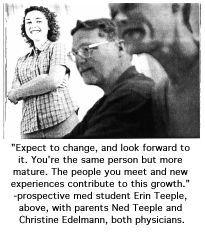 At
Mt. Lebanon, Teeple served on the student council, was a member of
the National Honor Society and graduated cum laude.
At
Mt. Lebanon, Teeple served on the student council, was a member of
the National Honor Society and graduated cum laude.
After the initial shock, Teeple's confidence soared. "I don't feel nervous," she says about the eight years of school ahead. "I like to work, and I tend to be accepting of any situation given to me."
Teeple and the others don't have any rigid expectations of college except that it should be an opportunity to have more freedom, meet new challenges and become more independent.
They all worry about maintaining a balance between a social life and schoolwork.
"There's always some trepidation when students first come to college, says Fred Lorenson, director of freshman development and special student services at Duquesne University. "I see it break down, as students start to feel a part of the environment and get more of a sense of independence. It usually takes a semester to adjust."
By holiday break, all five Mt. Lebanon freshmen have a feel for college and what to expect over the next four years.
Cimini was surprised by the conservatory's pace, both academically and socially, and concerned how she'd handle it.
"I didn't expect school to be so socially intense," she says. "You run into everyone you know at least once a day. It's hard to get personal time."
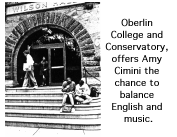 Peer
competition among the musicians is an issue.
Peer
competition among the musicians is an issue.
"I feel a lot of people compete with each other, but I choose not to take part in it," says the young violist. "It does nothing but ruin your focus."
Having a double major has proved a plus. When the pressures at the conservatory get to her, Cimini heads for the English Department, to be with her fellow majors there. Keeping the balance has helped make it an enjoyable semester. She has enjoyed her classes and her professors.
"I feel I've found a good course of study so there is no reason for me to deviate from it," she says.
A bigger school doesn't have to mean being lost in a crowd, Orient has discovered.
"You'd think Penn State is so big, but you see the same people everyday. I didn't notice it was that big," she says. Once she gets past some intro classes (biology had 800 kids) and into her business major, class size will decrease.
Now a member of Chi Omega social sorority, she's found a niche in the Greek system, She plans to join a business club in the spring.
Orient only found one surprise about college: "I thought my parents would miss me more, but they didn't"
Before Teeple left for Brown in August, she had said: "I'm sure I'll find something to be nervous about. But so far, there's nothing." This "nothing" eventually materialized.
"The day before I left, I got really scared about school. I got stressed out. Everything was so new; I didn't know what to do," she says. "After orientation, everything fell into place."
As the semester progressed, she grew even more comfortable at Brown. Classes were hard but interesting. She devoted a lot of time to a chemistry lab but managed to spend time with a new group of friends from her dorm. She considered getting involved in an outreach project for needy families but decided to hold off until second semester.
"Everything l thought was wrong, "Phillips said about the Air Force Academy. I thought it would be harder physically, but it was harder mentally and emotionally."
It took a lot of self-discipline to adjust to the academy rules, like keeping the bathroom sinks dry and the uniforms neatly ordered in the closet.
Still, Phillips, who is considering a major in environmental engineering, doesn't think he's been scarred by the strict environment. "I worry about coming back bitter and cynical. So far, I've kept my sense of humor and good nature," he says.
However, his regard for military authority changed. "A year ago, if a lieutenant visited my high school, I wouldn't have understood his position, rank and what he had to do to get there. I was never exposed to military life and people before. Now I have more respect for officers."
After a term at Cooper Union, Ruprecht hasn't found New York City overwhelming. She has explored the city and mastered the subway. "I haven't felt unsafe there at all," she says.
In fact, she misses New York so much that she plans to cut short her break at home just to have some free time to further explore the city.
"I love it. Everything is better than what I thought," she says.
Classes in color, drawing, art history, design and English went well, too. "I thought the work would be overwhelming. It's hard, but I manage, she says.
Ruprecht's freshman year was met with unexpected challenges and triumphs. She had to take off about four weeks to recover from mononucleosis, but was able to make up the work and complete the year successfully.
With only about 12 students in a class, Ruprecht knows almost everyone and has enjoyed being able to work closely with professors. "I thought I'd be intimidated by the other students, she says, recalling her trepidation of last September. "But everyone was at the same level."
Although Ruprecht is reluctant to classify her oil paintings and sculptures, she describes her work as tending toward modern art. She is confident that Cooper Union will be the best place to develop her talent.
This fall, she'll be living in an apartment, probably in Brooklyn.
Ruprecht views the move as a transition to her future in Manhattan. Most likely, she won't move back to Mt. Lebanon. As she says, "If you 're in the art world, the only place to live is New York. "
Like Ruprecht, Orient also spent five weeks at home recovering from illness, a kidney infection coupled with the flu. She considered withdrawing, but managed to return to school, make up the work, and-to her surprise and delight-get better grades than in the fall semester.
"Because I was home, sick, I figured I had to really study," Orient says.
The unexpected health problems delayed her plans to join a business society, but it taught her some lessons in independence. Before she went home to recover, she had to make her own doctor appointments and deal with being sick without mom's help. "I think you grow up a little more each year, "she says.
Another step toward maturity, Orient recognizes in herself an appreciation of the financial support of her parents, Kathleen and Robert.
"I think Penn State is so cheap. But other kids are on grants to get through school. If they don't get a 3.4 they're out. Because I see how much they have to work, I appreciate more what I have." she says. "I feel lucky."
By the end of the year at the academy, Phillips has learned he's capable of more than he thought.
"It's surprising how strong mentally you have to be. They give you more stuff than you can handle," says Phillips, who found time to play on the lacrosse team. Under pressure, Phillips says, he learned to better prioritize his time. He has decided to major in environmental engineering. And the calm and easygoing nature he had worried about losing helped him manage the stress. Already, 15 percent of the 1,220 cadets who started the year with Phillips have dropped out. By the time he graduates, the academy expects that 26 percent of the class will have quit.
School's been a lesson in humility. "Most of the kids that go are usually really smart and top of their class. You think you're going to be a hot shot. They (the instructors) make sure you know you're not top dog anymore."
Unlike the other four students, Phillips' summer break was only three weeks. He had to return to the Air Force Academy for combat survival training. He can rely on the discipline he developed in his first year, not only through a challenging summer but for the rest of his career in the military.
After a year at 0berlin's conservatory, Cimini was comfortable with her place among the musicians. "I felt I was a lot better than some and a lot worse than others. I fall somewhere in the middle, 11 she says.
She had expected to find that the competition she encountered at the conservatory was also strong among the English majors. But she found a more benign environment in the English Department.
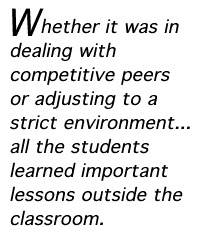 "I
expected to be pushed harder by classmates in the college. I thought
I would have a lot more interesting people and conversations in
class," she said. "A lot of discussions in class fell flat. It was
kind of frustrating."
"I
expected to be pushed harder by classmates in the college. I thought
I would have a lot more interesting people and conversations in
class," she said. "A lot of discussions in class fell flat. It was
kind of frustrating."
For Teeple, the most rewarding part of freshman year was the opportunity to confirm her career choice.
"In terms of academics, everything was interesting and challenging and worthwhile; I never felt I was wasting my time," says the chemistry major.
Both of Teeple's parents are doctors; still, meeting medical professionals on her own made her more excited about her career choice. "I'm really impressed by the relationships a doctor can form with a patient. I'd never think of another career," she says.
Some of her plans--organizing a community service group and joining social organizations-failed to materialize, but she achieved another goal: "I ran my first marathon in Cape Cod. I always wanted to run one."
And being able to budget enough time to train for the marathon was just as much an education as chemistry or biology, she notes.
Whether it was in dealing with competitive peers or adjusting to a strict environment, like Teeple, all the students from Mt. Lebanon learned important lessons outside the classroom.
This fall, they're back at their schools - a little older and much wiser but still following the paths they chose at high school graduation. Like the year before, 1999-2000 is bringing new experiences to fill more chapters in their life survival handbooks.